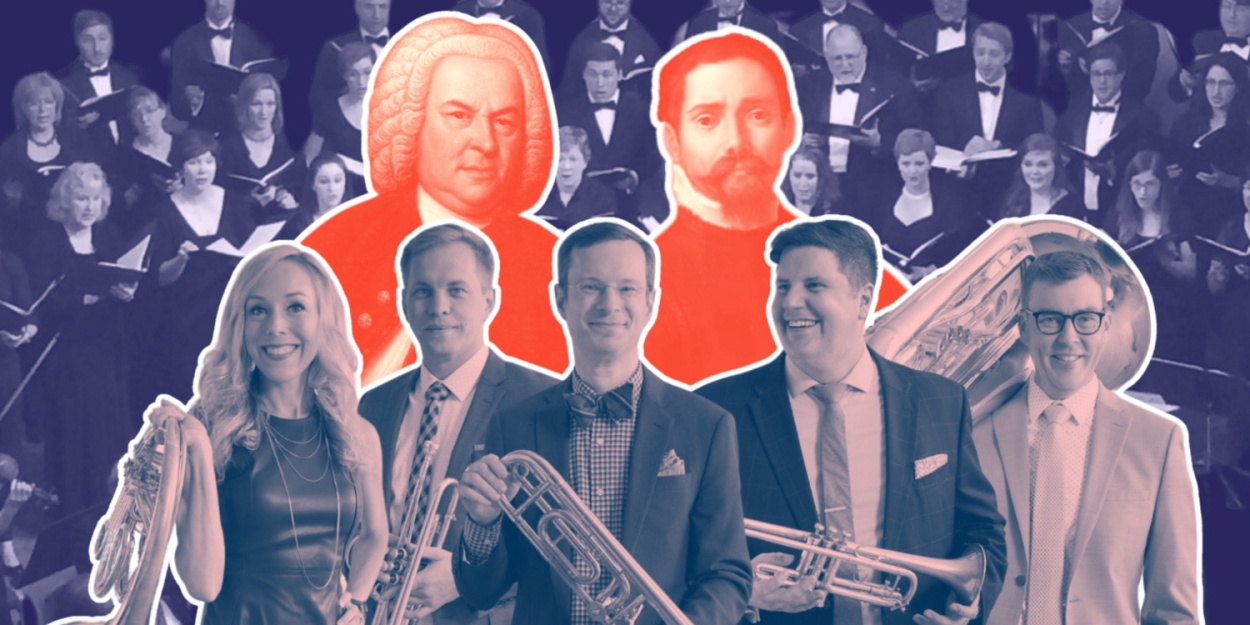Bach In The City To Debut With Music Of Bach And Gabrieli
The concert will take place on J. S. Bach's 329th birthday.

Bach in the City, successor to the Chicago area's long-running Bach Week Festival, will present "Bach and the Venetians," the new organization's inaugural concert program, at 7:30 p.m. March 21, 2025, at its home venue, St. Vincent De Paul Church, 1010 W. Webster Avenue, in Chicago's Lincoln Park neighborhood.
The concert, on J. S. Bach's 329th birthday, will feature one of the German Baroque composer's choral works with continuo (strings and portative organ), another that adds brass to the mix, and a solo pipe organ work. The program also offers brass and choral works by Renaissance composer Giovanni Gabrieli, an a cappella vocal work by contemporary composer Paul Mealor, and a work for brass, choir, and continuo by Andrea Gabrieli, Giovanni's uncle.
"Expect an evening of polychoral splendor," says music director-conductor Richard Webster, who held the same post for 50 years with the former Bach Week Festival.
Webster plans to take advantage of "the spaciousness, resonant acoustics, and visual beauty of St. Vincent De Paul Church" by having multiple groups (choirs) of voices and instruments positioned around the church.
"This concert will conjure the rich, multi-dimensional, kaleidoscopic interplay of sounds that audiences experienced when listening to the Gabrielis' polychoral masterworks at St. Mark's Cathedral in Venice, where each composer served a term as principal organist," Webster says.
Concert artists are Chicago's celebrated Gaudete Brass with guest brass musicians; the Bach in the City Chorus; organ soloist Jacob Reed, who has been heard on organ and harpsichord with the Newberry Consort, Haymarket Opera, Bella Voce, and others; Nomin Zolzaya, principal cellist with the Illinois Symphony Orchestra; and contrabassist Ian Hallas of the Chicago Symphony Orchestra.
Listeners will hear J. S. Bach's longest and most complex motet, the tender and lyrical "Jesu, meine Freude" (Jesus, my joy), BWV 227. The original version of Bach's poignantly beautiful motet (O Jesu Christ, meins Lebens Licht" (O Jesus Christ, light of my life), BWV 118, scored for choir and brass accompaniment, was written to be played outdoors at a graveside service.
Bach's Fantasy and Fugue in G Minor, BWV 542, for solo organ, known as "The Great G Minor," opens with a noble, tragic-sounding prelude, followed by a rollicking and inventive take on a Baroque dance tune.
Works by Giovanni Gabrieli include the "Sonata pian'e forte" (Sonata soft and loud) for a brass ensemble split into two groups facing one another from opposite sides of the hall. His "Canzon septimi toni" No. 2 calls for similar placement of instrumentalists in dialogue with each other. In Renaissance Italy, a canzon was a short, upbeat secular song. "Septimi toni" means "seventh mode" and refers to what's nowadays called the key signature.
Scott Tegge, Gaudete Brass's founding tuba player, says he and his colleagues "relish the rare opportunity to perform these pieces in the way that Gabrieli intended," as spatially separate brass choirs rather than as a single unit seated in front of the audience.
Gabrieli wrote his motet "Plaudite, Psalite" (Clap your hands, sing praises) for three mixed-voice choirs of sopranos, altos, tenors, and basses. The joyful "Alleluja" sections begin with one choir, then add a second, and end with all three.
Gabrieli's dazzling motet "In ecclesiis" (In the congregation) a 14, C. 78 also calls for three distinct choirs: four soloists and continuo accompaniment, full choir and continuo, and a brass choir.
Welsh composer Mealor (b. 1975) wrote "Locus iste" (This place), a sacred motet for four-part choir, in 2011 to celebrate the 500th anniversary of the King's College Chapel in Aberdeen, Scotland. He has composed music for some of the most important UK state, national, and Royal occasions of the past decade, including the wedding of The Prince and Princess of Wales in 2011.
Andrea Gabrieli's "Gloria in excelsis Deo" (Glory to God in the highest), another Renaissance masterwork designed for the expansive acoustics of St. Mark's, is composed in 16 parts, using voices and instruments in four four-part choirs. The work ends in a buoyant, triple-time rhythm.
Bach in the City describes the concert as a pilot project to gauge audience and donor interest in the new enterprise and help set the direction for future programming.
Tickets and information
Tickets for Bach in the City's "Bach and the Venetians" concert are $45 for VIP admission, which includes reserved seating and a souvenir tote bag; $30 adult general admission; $25 seniors 65 and older; and $10 students (with valid ID). Tickets are available at bachinthecity.org and by phone, 312-273-9834.
Bach in the City
Bach in the City is a new nonprofit musical organization based at St. Vincent De Paul Church in Chicago. The primary purpose of the new enterprise, heir to the beloved Bach Week Festival in Evanston, Illinois, is to present the choral, orchestral, and chamber music of Johann Sebastian Bach and other composers whose music would come to life in the splendid acoustic and visual setting of the historic Lincoln Park church.
Choir director, organist, and composer Richard Webster, who helped launch Bach Week in 1974 and was its music director for 50 seasons, serves in the same capacity for Bach in the City.
Comments

Videos

